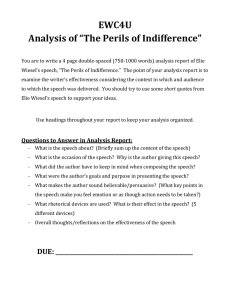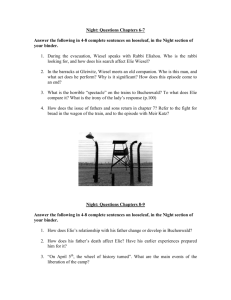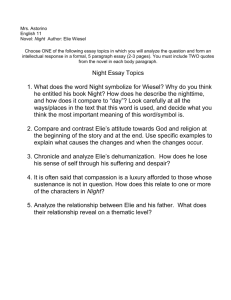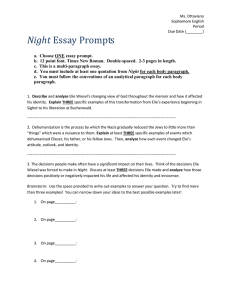Discussion Questions - Barren County Schools
advertisement
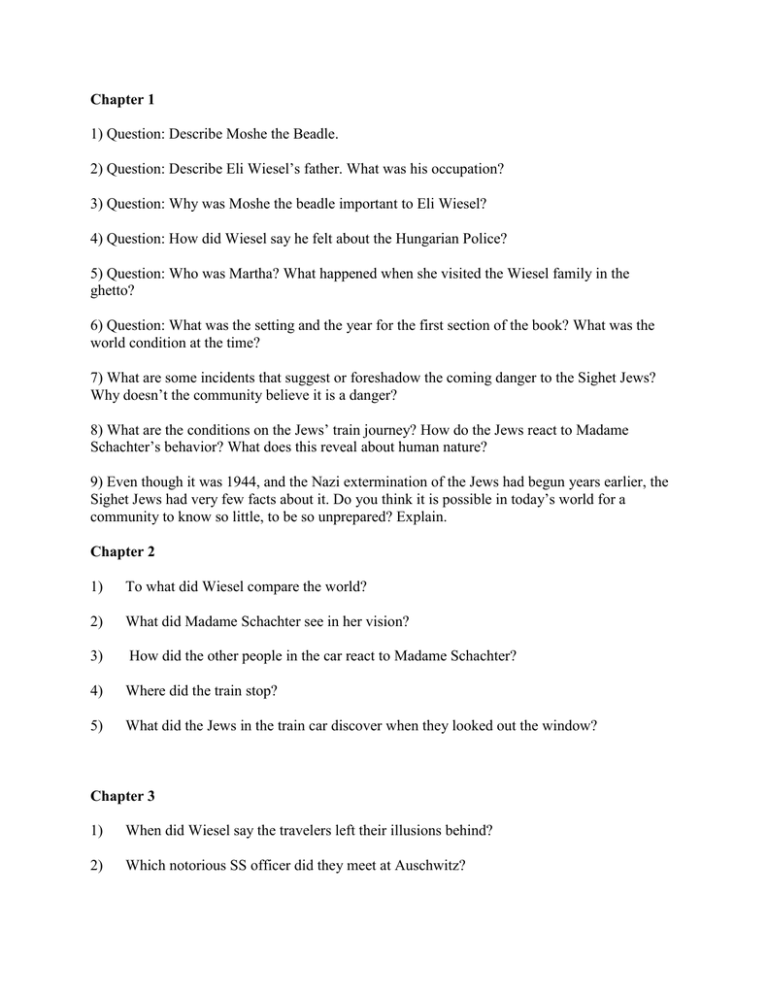
Chapter 1 1) Question: Describe Moshe the Beadle. 2) Question: Describe Eli Wiesel’s father. What was his occupation? 3) Question: Why was Moshe the beadle important to Eli Wiesel? 4) Question: How did Wiesel say he felt about the Hungarian Police? 5) Question: Who was Martha? What happened when she visited the Wiesel family in the ghetto? 6) Question: What was the setting and the year for the first section of the book? What was the world condition at the time? 7) What are some incidents that suggest or foreshadow the coming danger to the Sighet Jews? Why doesn’t the community believe it is a danger? 8) What are the conditions on the Jews’ train journey? How do the Jews react to Madame Schachter’s behavior? What does this reveal about human nature? 9) Even though it was 1944, and the Nazi extermination of the Jews had begun years earlier, the Sighet Jews had very few facts about it. Do you think it is possible in today’s world for a community to know so little, to be so unprepared? Explain. Chapter 2 1) To what did Wiesel compare the world? 2) What did Madame Schachter see in her vision? 3) How did the other people in the car react to Madame Schachter? 4) Where did the train stop? 5) What did the Jews in the train car discover when they looked out the window? Chapter 3 1) When did Wiesel say the travelers left their illusions behind? 2) Which notorious SS officer did they meet at Auschwitz? 3) What was Elie’s main thought as the men and women were being herded from the train? 4) What did Elie do when the gypsy struck his father? Why? What was his father’s response? 5) How long where Elie and his father at Auschwitz? Where did they go after that? Chapter 4 1) Describe Elie’s encounter with the dentist. 2) What were the only things in which Elie took an interest? 3) How did Elie describe the men after the air raid? 4) What happened to the young man from Warsaw? 5) How did Elie say the soup tasted the night the pipel (young servant boy) was hanged? 6) What events lead to the two hangings Wiesel describes? How does Wiesel feel about his evening meal after each hanging? What do his reactions suggest about how he is feeling? Chapter 5 1) What did the men do on the eve of Rosh Hashanah? 2) How did Elie feel while the others were praying? 3) What was Elie’s decision about fasting on Yom Kippur? Why did he make that decision? 4) What was Elie’s “inheritance” from his father? Why was his father giving it to him? 5) What did Elie dream of when he dreamed of a better world? 6) What happened to the patients who stayed in the hospital instead of getting evacuated? 7) When he arrives at Auschwitz and then at Buna, Wiesel describes scenes he will never forget. What scenes, ideas, or feelings from the memoir do you find unforgettable? 8) Describe the conditions first at the Birkenau reception center, then at Auschwitz, and later at Buna. How does Wiesel’s relationship with his father change during this time? 9) What are some ways that Wiesel and the other Jews at the camps try to observe their religion? How have Wiesel’s feelings about God changed since his captivity began? Chapter 6 – 9 1) While running, an idea began to fascinate Elie. What was the idea? What kept him from carrying out his idea? 2) What happens between Rabbi Eliahou and his son? What did Elie realize about Rabbi Eliahou and his son? 3) What does Wiesel’s reaction to this incident reveal about his relationship with God? 4) What was the name of the camp to which the men walked? 5) Describe Elie’s meeting with Juliek. 6) Who was Meir Katz? What happened to him? 7) What happened to Mr. Wiesel, Elie’s father? 8) What was Elie’s only desire? 9) Why do Wiesel and his father leave Buna? How do they respond to the circumstances of the forced march? 10) How does Wiesel’s link to his father affect his will to survive? 11) Given their life or deal situation, do you believe Wiesel’s attitude towards his father was understandable? Explain your reactions. 12) What happened on April 10, 1945? 13) Wiesel believes that remembering the Holocaust will help to ensure that this type of atrocity does not occur in the future. Do you think learning about the historical events can guide people to behave differently?
